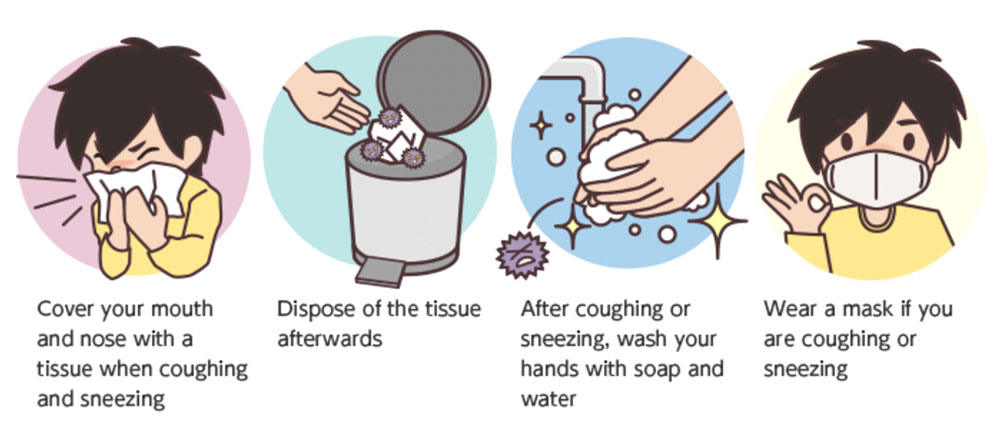What Should One Know About Flu?
Flu:
Flu is a respiratory infection caused by the influenza virus.

Types of Influenza Viruses:

The types are influenza A, B and C. Influenza A infects humans, animals and birds. It causes pandemics, epidemics and seasonal outbreaks. Swine flu (H1N1) is a type of influenza A virus. Influenza B infects humans and is known to cause epidemics and seasonal outbreaks. Influenza C infects humans and animals. It usually causes mild respiratory illness and only rarely leads to outbreaks.
Source of Infection:
Infected persons can spread the infection from 1 day before becoming symptomatic till 5 days after symptoms onset.
Modes of Spread:
Droplet, aerosol and fomite (contact objects) contact with an infected individual.
Being in close contact (within 1 metre) with an infected individual greatly increases the chances of getting infected where the droplets enter the susceptible person’s body through his nostrils.
When Do Flu Outbreaks Occur?
Outbreaks are common during rainy and winter months. This is probably due to 3 reasons:
- Better survivability of the virus in cold temperatures.
- Confinement of humans to indoors increases the chances of viral spread among them.
- Colder and drier air impairs the ability of airways to clear the virus.
In India, outbreaks have 2 peaks – January to March period and post-monsoon period (August-October).
Susceptible Population:
Individuals of all ages are susceptible. However, children < 5 years old, elderly people (> 65 years), pregnant women, those with comorbidities like diabetes, heart and lung conditions, liver disease, kidney disease, obesity, malignancy, those taking steroids and health care workers are at high risk of developing complications from flu.
Symptoms:

Most people experience only fever, headache, myalgias, sore throat, sneezing, running nose and rarely vomiting and diarrhoea. Symptoms generally last for 3-5 days. However, fatigue and myalgias might last for few weeks. People with risk factors are at risk of developing complications like pneumonia, ARDS, exacerbation of underlying COPD, encephalitis and myocarditis.
Management:
Patients are categorized into 3 groups:
| Category | Symptoms | Testing | Hospitalisation | Treatment with oseltamivir | Isolation (7 days) |
|---|---|---|---|---|---|
| A | Mild and no risk factors | No | No | No | Yes |
| B | B1: Fever > 102F, severe sore throat (or) B2: Risk factors present |
No | No | Yes | Yes |
| C | Breathlessness Altered mental status Hemoptysis Seizures Decreased urine output Worsening of symptoms beyond 72 hours Worsening of underlying chronic conditions |
Yes | Yes | Yes | Yes |
Oseltamivir:
- Treatment dosage for adults: 75 mg twice daily for 5 days
- Prophylaxis: 75 mg once daily for 7 days
All household contacts with comorbid conditions and healthcare workers are given prophylaxis.
COVID-19 vs Flu:
No clinical feature clearly differentiates the two. However, loss of smell or taste favours COVID-19. Hence, both are tested in symptomatic persons.
Masks:
- All infected persons, household persons of infected individuals and health care workers are advised to wear triple layered surgical masks.
- Healthcare workers performing aerosol generating procedures like intubation, sputum induction, nebulization, bronchoscopy and those working in ICUs and lab personnel are advised to wear N95 masks.
- People are advised to change the masks after 6 hours of usage or after they get wet and not to reuse masks.
- Masks have to be disposed properly by burning or deep burial after cleansing them with 5% bleach solution or 1% sodium hypochlorite solution.
- All are advised to follow cough etiquettes like coughing into handkerchiefs or into shoulder or upper arm.

Vaccination:
Influenza vaccination is advised for all older than 6 months of age annually after consultation with a doctor since natural immunity and immunity from vaccination are short-lived. Also, the influenza vaccination can be co-administered with the COVID-19 vaccine.

Dr. R. Nithiyanandan
Associate Consultant Pulmonary and Critical Care
Kauvery Hospital Chennai

